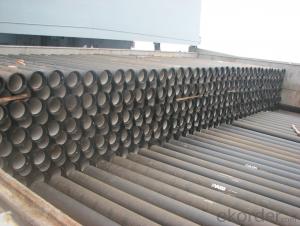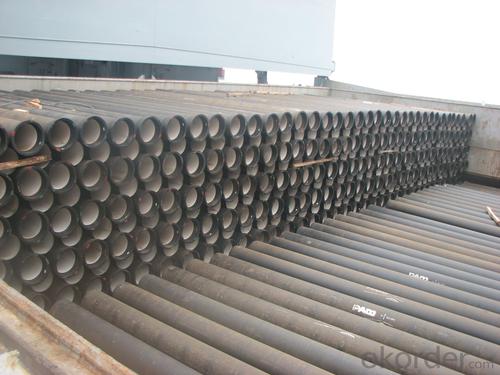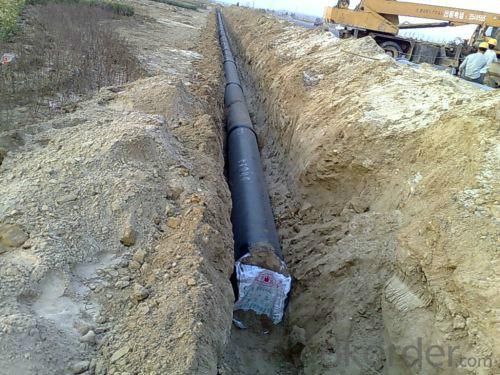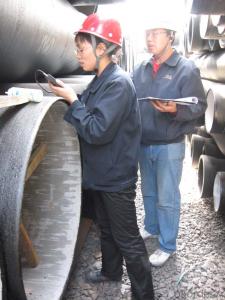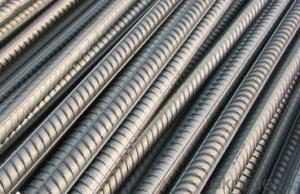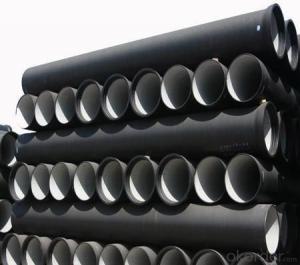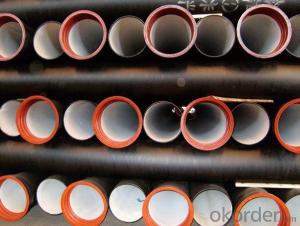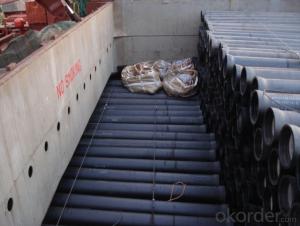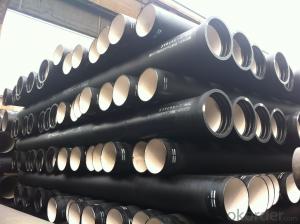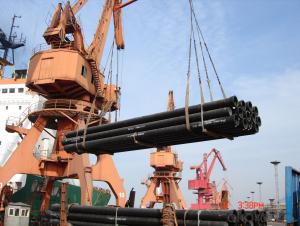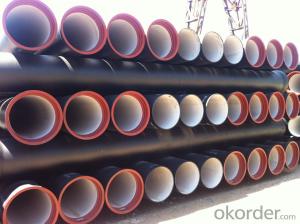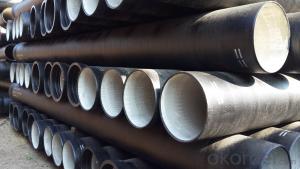Ductile Iron Pipe ISO2531/EN545/EN598 ClassC DN200-DN900
- Loading Port:
- China main port
- Payment Terms:
- TT or LC
- Min Order Qty:
- 25 m.t.
- Supply Capability:
- 200000 m.t./month
OKorder Service Pledge
OKorder Financial Service
You Might Also Like
1,Ductile Iron Pipe Description :
DI pipe fittings are manufactured according to ISO 2531 or BS EN545 or BS4772 FOR POTABLE WATER ,internal is cement lining or wet epoxy coating;External is zinc plus bitumen or wet epoxy coating. We also manufacture ductile iron fittings with fusion bonded epoxy both inside and outside. All the producets are sutible to water pipes fields.We have passed ISO9001,ISO14001,OHSMS18001 certificate.
2,Main Features of the Ductile Iron Pipe:
•High yield strength
•High tensile Strength
•High corrosion resistance
•Pressure Resistence
•Anti-corrosion
•Installation is convenient
•Satisfy the highest hygienic standards
• Mechanical testing after heat treatment
• Final NDE,dimension inspected
• Full Q.A document as per client request
• standard export package(carton/wooden case/pallet)
• accept FOB,FAS,CNF,CIF door to door etc or customer designated shipping agent
• Inspection: inspect in house, all our products must be checked 3 times before packing
3,Ductile Iron Pipe Images:
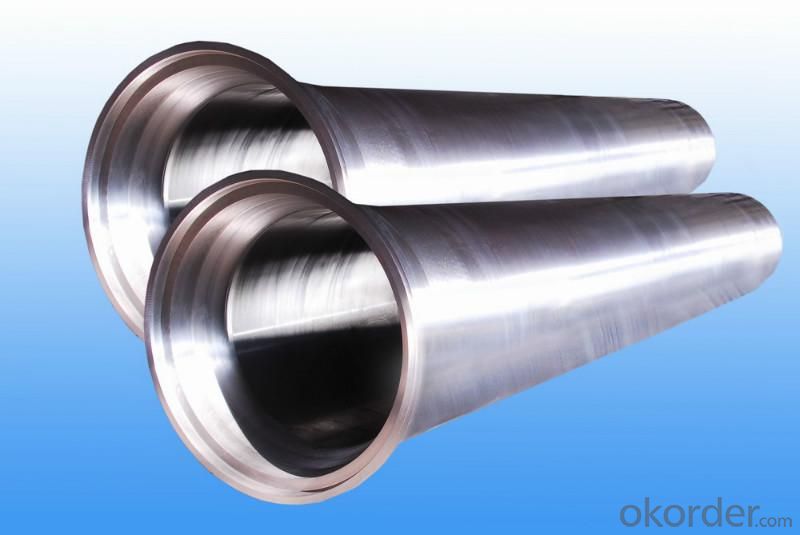
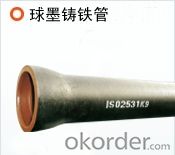
4. Ductile Iron Pipe Specification:
Surface Finishes: Bare, Oiled, Mill Varnish, Galv,FBE, FBE Dual, 3LPE, 3LPP, Coal Tar,Concrete Coating and Tape Wrap
End Finishes: Beveled, Square Cut, Threaded, hat
Additional Services: Internal Coating
Packaging: packed in bag, plastic bag, steel strip, steel wire,double wire, iron box, wooden box, tarpaulin, plastic sheeting
Inspection: MOODY SGS BV GL DNV ABS LIOYD’S
Test: X-ray, UT, magnetic particle,inspection,hydrostatic test.
Processing service: Beveling, Threading, Slotting, Cut-to length, Bends, Quench and Temper, Fabrication, Double-jointing and On-site assistance
Documentary: MTC, material certification,Origin certification, CI or PI,Test Report, export licence, handling order, B/L,insurance policy,shipping instructions, contract, packing list etc.
5.FAQ:
We have organized several common questions for our clients,may help you sincerely:
1.Q: Why would you choose ductile iron pipe rather than other pipe materials?
A:The reasons are obvious for that not only ductile iron pipe possesses the inherent strength and flexibility of ductile iron, combined with proven corrosion protection systems, but also the cost savings can be achieved from design to installation and commissioning.
2.Q:Why can you guarantee the inner of pipes can’t be corroded?
A: High alumina cement mortar lining and sulphate-resistant cement mortar lining. These two special linings are applicable to inner anti-corrosion for sewage pipes, improving resistance to erosion of the sewage components.
- Q: Are ductile iron pipes suitable for irrigation systems?
- Yes, ductile iron pipes are suitable for irrigation systems. They are known for their strength, durability, and corrosion resistance, making them a reliable choice for transporting water in agricultural settings. Additionally, ductile iron pipes can withstand high pressure and are resistant to external loadings, making them ideal for irrigation systems that require efficient water distribution.
- Q: What are the different methods for testing ductile iron pipe?
- There are several methods available for testing ductile iron pipe to ensure its quality and reliability. These methods include: 1. Hydrostatic Testing: This is the most common method used for testing ductile iron pipe. It involves filling the pipe with water and pressurizing it to a specified level. The pipe is then inspected for any leaks or deformations under the applied pressure. Hydrostatic testing helps determine the pipe's ability to withstand internal pressure without failure. 2. Tensile Testing: This method involves subjecting a sample of the ductile iron pipe to a gradually increasing tensile load until it fractures. The test measures the ultimate tensile strength, yield strength, and elongation of the material. Tensile testing helps evaluate the pipe's mechanical properties and its ability to withstand tension without breaking. 3. Hardness Testing: This method measures the hardness of the ductile iron pipe using various techniques such as Brinell, Rockwell, or Vickers hardness tests. Hardness testing provides information about the material's resistance to deformation, wear, and fatigue. It helps assess the pipe's durability and resistance to external forces. 4. Impact Testing: This method involves striking a notched sample of the ductile iron pipe with a pendulum or falling weight to measure its impact resistance. The test determines the material's ability to absorb energy during sudden loading or impact. Impact testing helps evaluate the pipe's ability to withstand accidental impacts or dynamic loads. 5. Ultrasonic Testing: This non-destructive testing method uses high-frequency sound waves to detect internal defects or discontinuities in the ductile iron pipe. Ultrasonic testing can identify voids, cracks, or inclusions that may affect the pipe's structural integrity. It helps ensure the pipe's soundness and reliability. 6. Magnetic Particle Testing: This method is primarily used for detecting surface or near-surface defects in the ductile iron pipe. It involves applying a magnetic field to the pipe and then applying magnetic particles to the surface. Any defects present will cause the magnetic particles to gather and form visible indications. Magnetic particle testing helps identify surface cracks, laps, or other defects that may affect the pipe's performance. These different testing methods help ensure that ductile iron pipe meets industry standards and specifications, ensuring its quality and reliability in various applications.
- Q: Is ductile iron pipe breakable?
- The ductile iron pipe has many uses in our city construction, for our city water supply, gas supply and so on. But ductile iron pipes are also very useful in sewage disposal. As we all know, ductile iron pipe has many excellent properties, such as high strength, corrosion resistance, high pressure resistance, low accident rate, long service life and Gao Yanshen rate. It is an excellent water supply pipe.
- Q: How does ductile iron pipe perform in areas with high soil corrosivity?
- Ductile iron pipe performs well in areas with high soil corrosivity due to its inherent corrosion resistance. The unique composition of ductile iron, with its graphite nodules providing internal protection, makes it highly resistant to corrosion from soil and external factors. This allows the pipe to maintain its structural integrity and longevity in corrosive environments, making it a reliable choice for such areas.
- Q: Can cast iron pipes not be used for domestic water supply and drainage?
- Cast iron pipes are mostly used in fire fighting, fire hydrant water supply and indoor water supply. Plastic pipes are used in general and high water riser pipes are made of plastic steel composite pipes
- Q: Can ductile iron pipes be used for underground sewage systems?
- Yes, ductile iron pipes can be used for underground sewage systems. Ductile iron is a type of cast iron that has enhanced flexibility and strength, making it suitable for various applications, including sewage systems. Ductile iron pipes offer several advantages for underground sewage systems. Firstly, they have excellent corrosion resistance, which is crucial in sewage systems where the presence of moisture and chemicals can cause corrosion over time. This resistance to corrosion ensures the long-term durability and reliability of the pipes. Secondly, ductile iron pipes have high tensile strength, allowing them to withstand the pressure and stress that can occur in underground sewage systems. They are resistant to ground movements, such as soil settling or shifting, which can cause damage to other types of pipes. Furthermore, ductile iron pipes have a smooth internal surface, which results in a better flow capacity and reduces the likelihood of clogging or blockages in the sewage system. This smooth surface also helps to minimize the accumulation of debris and sediment, reducing the need for frequent maintenance and cleaning. Another important factor is that ductile iron pipes are available in various sizes and can easily be connected using a range of joint systems, allowing for flexibility in designing and constructing underground sewage systems. In summary, ductile iron pipes are an excellent choice for underground sewage systems due to their corrosion resistance, high tensile strength, smooth internal surface, and ease of installation.
- Q: Can ductile iron pipes be used for gravity flow applications?
- Yes, ductile iron pipes can be used for gravity flow applications. Ductile iron pipes are known for their strength, durability, and ability to handle high-pressure flow, making them suitable for various gravity flow systems such as sewage, stormwater, and water distribution networks.
- Q: What is the process of fusion bonding for ductile iron pipes?
- The process of fusion bonding for ductile iron pipes involves joining two or more pipes together using heat and pressure to create a strong and durable bond. This technique is particularly used in the construction and installation of underground water, sewer, and gas pipelines. The first step in the fusion bonding process is to clean and prepare the surfaces of the pipes to be joined. This involves removing any dirt, debris, or rust that may interfere with proper bonding. Specialized cleaning tools and techniques, such as wire brushing or sandblasting, are often employed to ensure a clean and smooth surface. Once the surfaces are prepared, the pipes are aligned and clamped together. A fusion bonding machine, also known as a fusion welder, is then used to apply heat and pressure to the joint area. The fusion bonding machine consists of heating elements that are positioned around the joint and a hydraulic system that applies the necessary pressure. The heating elements are typically electric or gas-powered and are designed to reach temperatures high enough to melt the ductile iron material. As the heat is applied, the ductile iron surfaces begin to soften and fuse together, creating a strong bond. The pressure from the fusion bonding machine ensures that the molten iron flows evenly and uniformly between the joint surfaces, promoting a seamless connection. The duration of the fusion bonding process varies depending on the size and thickness of the pipes, as well as the specific requirements of the project. Once the fusion bonding is complete, the joint is allowed to cool and solidify, forming a permanent and leak-proof connection. Fusion bonding offers several advantages for ductile iron pipes. It provides a reliable and durable joint that can withstand high pressure, temperature variations, and external loads. The seamless connection also minimizes the risk of leaks, which is crucial for underground pipelines that transport water, sewage, or gas. Overall, fusion bonding is a widely used technique for joining ductile iron pipes, ensuring their structural integrity and longevity in various infrastructure projects.
- Q: Will the quality of ductile iron shrink?
- Fool you. It is normal that the surface shrinks and goes down, but it can not be said to be good.
- Q: Can ductile iron pipes be used for marine applications?
- Yes, ductile iron pipes can be used for marine applications. Ductile iron is known for its high strength and durability, making it suitable for various environments, including marine environments. It has excellent corrosion resistance properties, which enable it to withstand the harsh conditions of saltwater exposure. Additionally, ductile iron pipes have been used in marine applications such as wastewater treatment plants, desalination plants, and offshore platforms. However, it is important to consider proper coating and maintenance to enhance the longevity of ductile iron pipes in marine applications.
Send your message to us
Ductile Iron Pipe ISO2531/EN545/EN598 ClassC DN200-DN900
- Loading Port:
- China main port
- Payment Terms:
- TT or LC
- Min Order Qty:
- 25 m.t.
- Supply Capability:
- 200000 m.t./month
OKorder Service Pledge
OKorder Financial Service
Similar products
Hot products
Hot Searches
Related keywords
